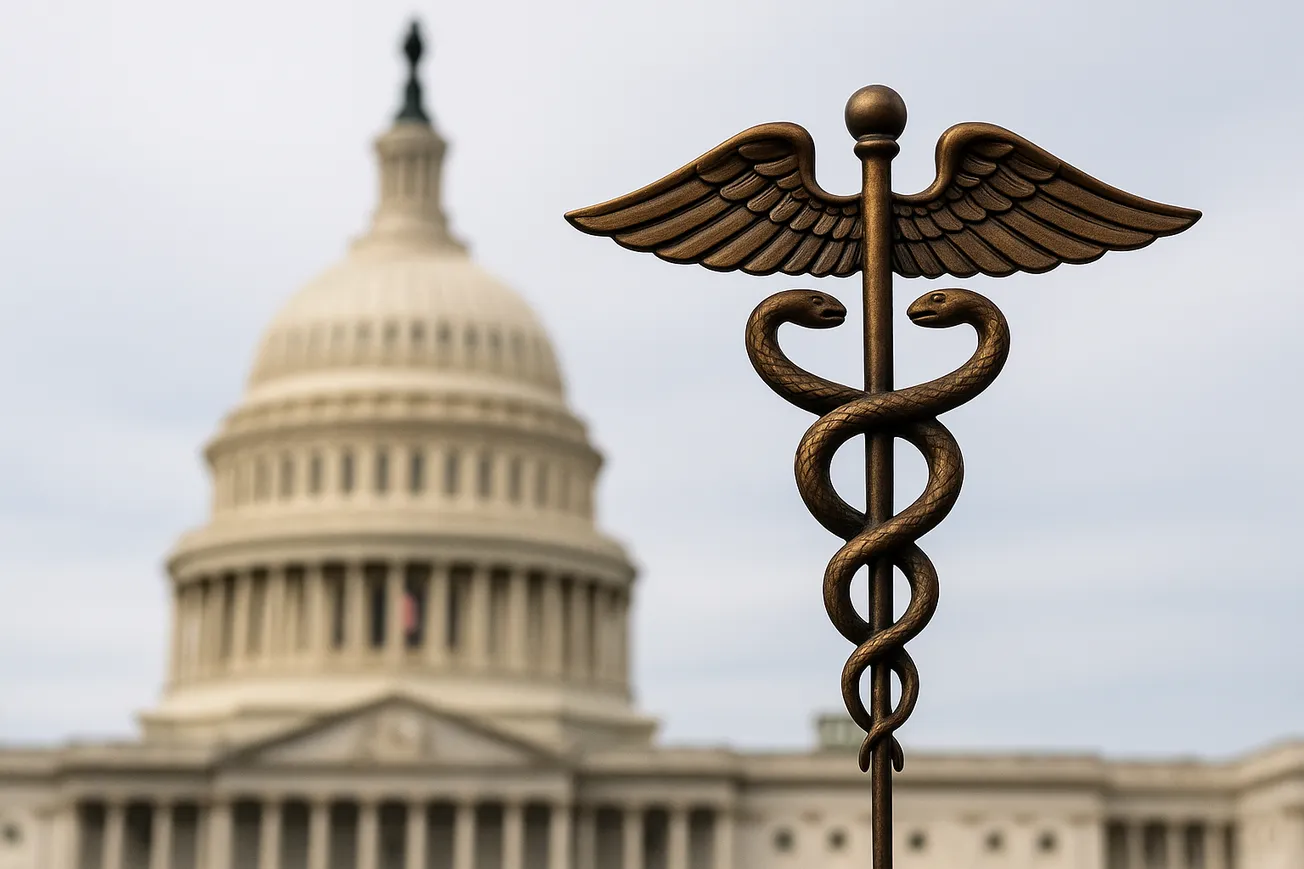If one were to tune into any liberal media outlet, the doomsday clock is to strike at 12:01 AM on Saturday. Not the actual doomsday clock indicating the chance of a nuclear conflict, but the one that triggers a government shutdown.
The media knows that, as a practical matter, a government shutdown doesn't mean anything to most people. But stating so isn't newsworthy. So, they inflate the story to make it appear as though things are a lot worse than they actually are.
A government shutdown occurs when the U.S. Congress fails to pass funding legislation to cover the operations of federal agencies and departments. The deadline for this is Saturday at 12:01. Even if Congress were to pass something to avert a shutdown, our editorial holds for future such instances.
While shutdowns are rare—only five have occurred during the last 30 years—they are happening more frequently. The previous three shutdowns, one under Obama and two under Trump, hit Washington in the last 11 years. The longest shutdown in U.S. history, 35 days, resulted from a standoff - President Trump quarreled with Congress over funding for a proposed border wall between the U.S. and Mexico- affecting numerous federal operations and employees.
The financial impact is minimal. By law, critical services like Social Security payments, law enforcement, air traffic control, military operations, emergency medical care, and mail delivery continue during a shutdown. Essential federal workers are required to work but won't get paid during the shutdown; their earnings will be retroactively paid when the shutdown ends.
"Non-essential" employees are those whose jobs are not deemed critical to the safety of human life or the protection of property during a funding lapse. These are generally workers in administrative, human resources, training, and support roles in agencies like the National Park Service, NASA, the Passport Office, or national museums and libraries. War memorials in Washington will rope off monuments with signs saying that the popular tourist spots are closed because of the shutdown. Many government regulatory and enforcement actions— for example, civil charges from the Securities and Exchange Commission against a company that has violated securities law—will pause during a shutdown. These workers will be placed on an unpaid leave.
Then again, the term "unpaid leave" is inherently inaccurate. In 2019, Congress passed the Government Employee Fair Treatment Act, which guarantees that all federal employees—whether furloughed or required to work without pay during a shutdown—receive retroactive pay once the government reopens. In other words, non-essential workers get free vacation time during the shutdown, are not responsible for completing any tasks, and will get back pay once the shutdown ends. For most federal employees, it's an excellent deal.
A long enough furlough may impact some non-essential federal employees living paycheck to paycheck. However, most federal credit unions extend zero-interest or low-cost loans to cover the period, significantly lowering the impact.
Many government agencies want to promote the false idea that shutdowns disrupt everyday life, and with the help of the propaganda press, these agencies are eager to amplify this message.
Shutdowns are great theater for liberal politicians. Shutdowns place on full display the dysfunction of our government and provide an opportunity for liberals to bad-mouth other legislators who caused the shutdown as “people who don't care enough about their constituents.”
Sen. Mark Warner, Democrat of Virginia, tweeted: "Hard to imagine anything more heartless than shutting down the government and leaving disaster victims out in the cold just days before Christmas. Absolutely outrageous this is even a possibility." Warner was the same senator who stayed silent when President Biden's FEMA delayed disaster support to North Carolina citizens during the storms two months ago.
Connecticut Third District Rep. Rosa DeLauro, the ranking member of the House Committee on Appropriations and a 33-year-Congresswoman who proudly promotes her pork-barrel spending projects to benefit her district, erupted: "The American public has been clamoring for this body to work together, Democrats and Republicans across the aisle, to do what is in the best interest of the American people ...And you know what? They got scared because 'President' Musk told them, 'President' Musk said, 'Don't do it. Don't do it. Shut the government down....’ Imagine! What does he know about what people go through when the government shuts down? Are his employees furloughed? Hell no. Is he furloughed? No."
CRs are not the answer. Washington is in this perennial mess because it resorts to one-size-fits-all omnibus spending bills, always rushed through as a Continuing Resolution with days to spare, with influential members' every pet project included. The House is then asked to vote for the entire bill up or down.
Congress hasn't used the formal appropriations process since 1997. CRs were never intended to replace the actual appropriations process, a formal procedure through which the U.S. Congress allocates funding to federal government agencies, departments, and programs.
The world-class appropriations process starts with the President submitting a proposed federal budget to Congress, typically in February for the next fiscal year (beginning October 1). The House and Senate Budget Committees then draft a budget resolution, which sets overall spending limits for the federal government.
Finally, Congress divides funding responsibilities among 12 appropriations subcommittees in the House and Senate, each overseeing a specific part of the federal budget (e.g., Defense, Agriculture, Education). Each subcommittee drafts an appropriations bill that allocates funds to the departments and programs under its jurisdiction.
The appropriations bills are debated, amended, and voted on in both chambers of Congress. Differences between the House and Senate versions are resolved in a conference committee.
Once the final version of each appropriations bill is approved by both the House and Senate, it is sent to the President for his or her signature.
If the President signs the bill, it becomes law. If the President vetoes the bill, Congress can override the veto with a two-thirds majority in both chambers.
Completing all appropriations bills on time - and using the appropriations process - has been rare. Since the current budget process was established in 1976, Congress has passed all required appropriations measures on time only four times: for fiscal years 1977, 1989, 1995, and 1997.
It is little wonder that America has a $36 trillion debt burden but still experiences periodic government shutdowns. However, no one in the legacy media wants to disclose this truth to the public.
TIPP Picks
Selected articles from tippinsights.com
1. Public Support Shifts From Defund Police to Pro-Police Policies Nationwide - Craig Floyd, The Daily Signal
2. IRS Whistleblowers Push Forward On Defamation Case Against Hunter Biden’s Lawyer - Fred Lucas, The Daily Signal
3. MSNBC Legal Analyst Lays Out What Will Likely Happen Next After Fani Willis Was Booted From Trump Case - Jason Cohen, DCNF
4. Where’s Our $300 Million? - Editorial Board, Issues & Insights
5. Biden Promised A Return To Normalcy, Looks Like Trump Will Deliver It - Editorial Board, Issues & Insights
6. Biden Policies Slowed America’s Wireless Internet Expansion To Dial-Up Speed - Seton Motley, The Daily Signal
7. Trump Should Pattern Presidency After Eisenhower - Rep. John J. Duncan Jr., The Ron Paul Institute
8. From Public Defender To Public Servant — If Liberals Were Honest, They’d Love The Kash Patel Story - Michael Spivack, Daily Caller
9. Trump Administration Nomination Signals Return To Respect For Effective Patent Rights - Adam Mossoff, The Daily Signal
10. Tom Homan Tells Tucker Carlson He ‘Used to Respect’ Mayorkas - Virginia Allen, The Daily Signal
11. Showdown In DOGE City - Peter van Buren, The Ron Paul Institute
12. North Carolina Lawmakers Demand Congress Pass Disaster Aid Before Leaving Town - Adam Pack, DCNF
13. Explaining The Beef Between Donald Trump And Chip Roy - Bradley Devlin, The Daily Signal
14. America Needs A Subzero Blackout Prevention Program - David Wojick, CFACT
15. International And State Interference In U.S. Energy Must End - Paul Driessen, CFACT
16. Global Coal Consumption Hit Record High In 2024 | Infographics - TIPP Staff, TIPP Insights
17. The Dumbest Fallacy In Foreign Policy - Ben Shapiro, The Daily Signal
18. Pentagon Spox Admits He ‘Recently Learned’ He’d Been Peddling False US Troop Numbers In Syria - Wallace White, DCNF
19. Several Hundreds Dead In Mayotte Cyclone | Infographics - TIPP Staff, TIPP Insights
20. Two Russian Oil Tankers Wrecked In Black Sea | Infographics - TIPP Staff, TIPP Insights
21. Bomb Explosion Kills Russian General In Moscow | Infographics - TIPP Staff, TIPP Insights
22. Alleged Chinese Spy Banned | Infographics - TIPP Staff, TIPP Insights
TIPP Takes
Geopolitics, Geoeconomics, And More
1. Human Rights Watch Accuses Israel Of 'Extermination' By Intentionally Depriving Gaza Of Water - UPI
Human Rights Watch said that Palestinians in Gaza are being deliberately starved of water by Israel in what could amount to "acts of genocide."

The New York-based advocacy group alleged in a new report that Israel had inflicted conditions of life calculated to bring about the destruction of part of the population by intentionally depriving people of adequate access to safe water for drinking and sanitation needed for "basic survival", most likely resulting in thousands of deaths.
2. Top U.S. Diplomat Says Iran Won’t Have Future Role In Syria After Meeting HTS Leader - Al Arabiya
Senior U.S. officials met with “Hayat Tahrir al-Sham” (HTS) leader Ahmed al-Sharaa, a U.S.-designated terrorist, during their first trip to Syria since the fall of the al-Assad regime last week.

In a call with reporters after the trip to Syria, Assistant Secretary of State for Near Eastern Affairs Barbara Leaf revealed that she had told al-Sharaa that Washington would no longer pursue the $10 million bounty on his head. It is unclear whether or not the U.S. will revoke al-Sharaa’s terror designation and remove the HTS from its terror blacklist.
3. Syrian Opposition ‘Set Iranian Project Back 40 Years,’ Ahmad Al-Sharaa Says - Al Arabiya
Syrian opposition groups that toppled the al-Assad regime “set the Iranian project in the region back by 40 years,” Ahmad al-Sharaa, head of the new government, said in an interview.

Speaking to pan-Arab publication Asharq al-Awsat, the opposition leader, also known as Abu Mohammad al-Jolani, stressed that Syria would no longer be used to “attack or destabilize” any country in the Arab or Gulf region.
“By removing Iranian militias and closing Syria to Iranian influence, we’ve served the region’s interests—achieving what diplomacy and external pressure could not, with minimal losses,” he said.
4. Ukraine Military Drops Leaflets Urging North Korean Troops To Surrender - RFA
The Ukrainian military is dropping Korean-language leaflets urging North Korean troops fighting on Russia’s side of the war to “Surrender today and join South Korea tomorrow,” Radio Free Asia has learned.

The leaflets appear in a video shared on the Telegram social media website by InformNapalm, an organization that has been reporting on the situation in Ukraine. Meanwhile, the Ukrainian website evocation.info also published on Telegram evidence that North Korean soldiers are provided with Russian ID, likely to hide their nationality in the event they are killed.
5. Georgia Promises Changes To 'Foreign Agents' Law Amid Mounting International Pressure - RFE/RL
The Georgian government has pledged to amend its controversial "foreign agents" law following discussions with the secretary-general of the Council of Europe, Alain Berset.

Berset announced at a press briefing in Tbilisi, wrapping up a three-day visit, that a working group including Georgian representatives, the Council of Europe, and the Venice Commission will be formed to draft necessary changes to the legislation. The law, modeled on a similar Russian law, mandates that organizations receiving significant foreign funding register as "foreign agents."
6. Biden Approves $571 Mln In Defense Support For Taiwan - Reuters
In a statement, the White House said Biden had delegated to the secretary of state the authority “to direct the drawdown of up to $571.3 million in defense articles and services of the Department of Defense, and military education and training, to provide assistance to Taiwan.”

It provided no further details.
7. Merck Reaches Weight-Loss Drug Deal Worth Up To $2 Billion With China-Based Hansoh - UPI
Merck announced a weight loss drug deal with China-based Hansoh worth up to $2 billion for the pill code-named HS-10535. It includes an upfront $112 million licensing rights payment for global sales outside China.

Hansoh could get an additional $1.9 billion if it reaches clinical, regulatory and commercial milestones. The drug is experimental and works by targeting a gut hormone called GLP-1 like Wegovy does.
8. Immigration Agency Deports Highest Numbers Since 2014, Aided By More Flights - A.P.
U.S. Immigration and Customs Enforcement deported more than 270,000 people to 192 countries over a recent 12-month period, the highest annual tally in a decade, according to a report.

It illustrates some of the financial and operational challenges that President-elect Donald Trump will face to carry out his pledge of mass deportations. ICE, the main government agency responsible for removing people in the country illegally, had 271,484 deportations in its fiscal year ended Sept. 30, nearly double from 142,580 in the same period a year earlier.
9. Foxconn In Talks To Buy Renault's Stake In Nissan - Kyodo News
Taiwan's electronics giant Foxconn is in talks with Renault SA, the largest shareholder of Nissan Motor Co., to acquire the French company's shareholding in the Japanese automaker, a Foxconn source said.

The move comes as Nissan and Honda Motor Co. have reportedly begun discussions on a merger to create the world's third-biggest auto group by volume. Foxconn's move may impact the course of the talks between the two automakers.
10. N Korea Hackers Stole $1.3bn Of Crypto This Year - Report - BBC
A total of $2.2bn in cryptocurrencies has been stolen this year, with North Korean hackers accounting for more than half that figure, according to a new study.

Research firm Chainalysis says hackers affiliated with the reclusive state stole $1.3bn of digital currencies - more than double last year's haul. Some of the thefts appear to be linked to North Korean hackers posing as remote IT workers to infiltrate crypto and other technology firms, the report says.
11. WHO Declares Marburg Virus Disease Outbreak In Rwanda Over - UPI
The WHO made the declaration as 42 days had passed since the last patient tested negative for the virus twice.

The Rwandan government said the outbreak, which had been confirmed on Sept. 27, caused 15 deaths while 66 cases were reported. The government said 80% of those affected were healthcare workers treating ill patients. The disease is highly virulent with a fatality rate from 24% to 88%, said WHO officials.
12. Here's How Much You Should Have Invested For Retirement At Age 60 - The Motley Fool
Many retirement experts also recommend how much you should save by the time you reach various ages. For instance, Fidelity recommends how much you should have saved by certain age milestones in your life, assuming you want to retire at age 67.

Age 30: 1x salary; Age 35: 2x salary; Age 40: 3x salary; Age 45: 4x salary;Age 50: 6x salary; Age 55: 7x salary; Age 60: 8x salary; Age 67: 10x salary
The median weekly salary of full-time workers in the U.S. came in at $1,165 in Q3 2024, according to the U.S. Bureau of Labor Statistics, which equates to $60,580 per year. If you wanted eight times that amount by age 60, that would equate to $484,640.
13. Trump Is Looking To Create A Bitcoin Strategic Reserve. How Would That Work? - USA Today
Bitcoin prices have been climbing this year thanks in part to President-elect Donald Trump's messaging on creating a crypto-friendly administration ‒ including plans to stockpile the volatile digital currency.

According to crypto tracking firm Arkham Intelligence, the United States already owns nearly $20 billion worth of bitcoin obtained through legal seizures.
Federal officials will occasionally sell off the cryptocurrency, but Trump has expressed interest in halting future sales to create a "core" stockpile of bitcoin.
14. Report: 1 In 5 Adults With Long COVID Struggle With Daily Activities - HealthDay News
"Frequently reported symptoms include fatigue that interferes with daily life, difficulty thinking or concentrating, cough and heart palpitations," explained a team of researchers at the U.S. Centers for Disease Control and Prevention.

According to the CDC, Long COVID can include "a wide range of ongoing symptoms," such as fatigue, brain fog, feeling exhausted after exercise, coughing, shortness of breath, sleep troubles, depression/anxiety, joint pain, gastro issues and more.









